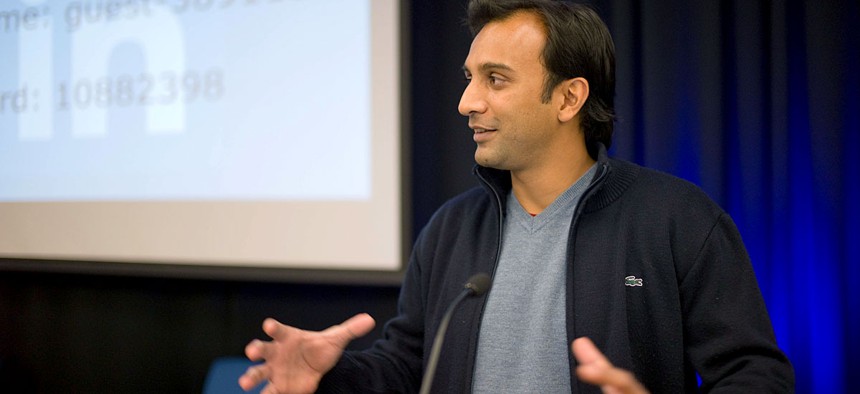DJ Patil to Tech Industry: Don’t Just ‘Throw Stones’ at Government

DJ Patil, the nation's first Chief Data Scientist Flickr user Joi Ito
The U.S. chief data scientist says innovative outsiders have a unique opportunity to make their voices heard inside government.
Despite recent recruiting successes by the Obama administration to woo top technologists to government, it’s no secret there’s been an at-times frosty relationship between the tech industry and Uncle Sam.
Administration officials’ stance on privacy and encryption technologies have soured many techies on federal service. Not to mention the popular perception of government as a bureaucratic black hole.
But DJ Patil, the first U.S. chief data scientist and a recent Silicon Valley transplant himself, suggested innovative outsiders have a unique opportunity to make their voices heard inside government.
"The really cool thing that I think has happened over the last few years has been the realization that tech policy is just endemic through every single thing we do” in government, Patil said Tuesday at the Wired Business Conference in New York.
“Those of us that are technologists out there: It's our job not just to throw stones and say, 'Hey, how come you guys can't do it this way?’” he added. “We have to get in there. We have to embrace the problem. We have to own the problem with them.”
The government can handle dissenting opinions and is willing to engage its critics, Patil said. He cited the recent hiring of renowned Princeton computer scientist, Ed Felten -- a noted critic of the National Security Agency’s mass surveillance -- to serve as White House deputy chief technology officer under Megan Smith, herself a recent Google transplant.
Felten “has been out there on the forefront of questions like encryption and privacy and very, very hard questions,” Patil said. “And so, we're really looking forward to having someone like that."
Patil, formerly of Salesforce subsidiary RelateIQ and LinkedIn, acknowledged that’s a “big shift” away from the top-down approach to policymaking that Washington has typically favored.
“If we look over the history of how the government has interacted on these technology issues, we are best as a country when we are having hard discussions, very difficult dialogue,” he said. “Everything from the Clipper Chip to questions around Edward Snowden, encryption. When we go and we have those dialogues, and we're sitting at the table working for Team America and really figuring out what is the right solution -- that's when we're at our best.”
U.S. Digital Service Names New Head of ‘People Operations’
Another administration effort, the U.S. Digital Service, headed by former Google engineer Mikey Dickerson, aims to embed top digital talent in teams scattered across federal agencies. Patil announced at the Wired event Dickerson’s team had just hired Daniel Portillo, vice president of talent at Greylock Partners, to work on recruiting for the teams.
In a message on LinkedIn, Portillo said he took a leave of absence from the Menlo Park, California-based venture capital powerhouse "to assist the U.S. Digital Service recruit the people it needs to build world-class services for the American people." He’ll work alongside former CTO Todd Park, who has been recruiting from Silicon Valley since last August. Portillo’s LinkedIn profile lists his official job title at USDS as running “people operations."
The digital service model is one way the administration is thinking about how to “ingrain” tech skills at agencies, Patil said.
“That becomes a challenge because you have institutions that have literally existed since the founding of the country -- it's one of the places that you get to say that,” he added.
For example, take Patil’s specialty: data science. It’s still a new field made up of a number of different disciplines.
“Where do people go?" he said. "You've got statisticians. You've got economists. A lot of times, they're in different parts of the organization and don't even have the ability to talk to each other. Data science bridges that.”





